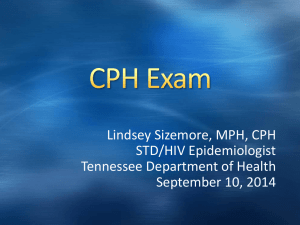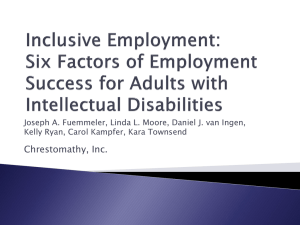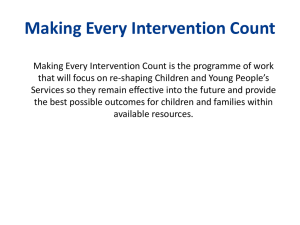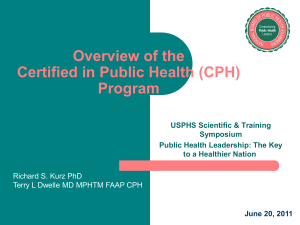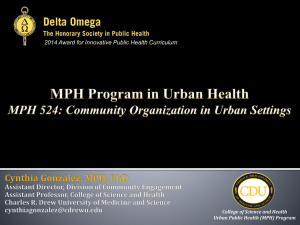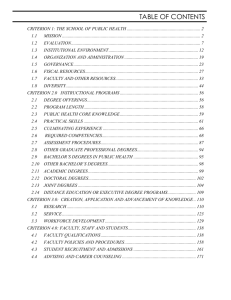Addressing Barriers for Multi-Agency Cooperation and Coordination
advertisement
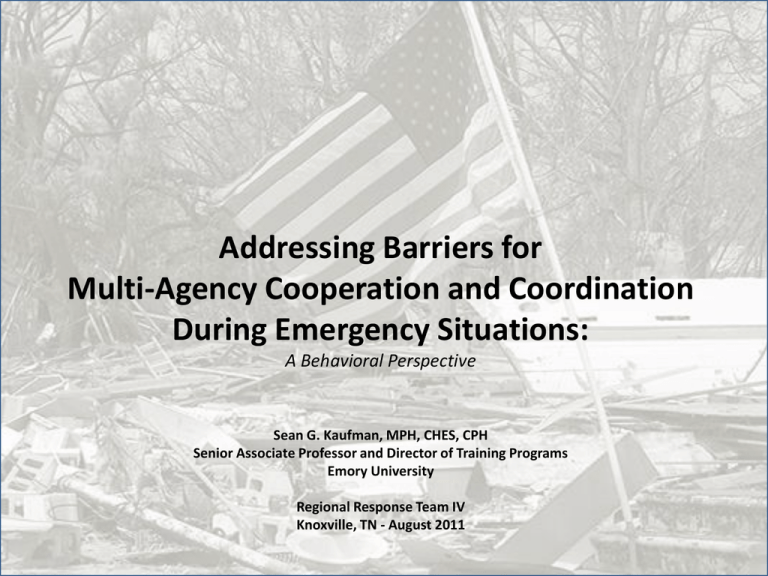
Addressing Barriers for Multi-Agency Cooperation and Coordination During Emergency Situations: A Behavioral Perspective Sean G. Kaufman, MPH, CHES, CPH Senior Associate Professor and Director of Training Programs Emory University Regional Response Team IV Knoxville, TN - August 2011 A Behaviorist Really not magic. What is the differences between a lesson learned and a lesson ignored? -5- CHANGE. “Insanity: Doing the same thing over and over again expecting different results.” Regional Response Team IV Multi-Agency Cooperation and Coordination During Emergency Situations: A Behavioral Perspective Sean G. Kaufman, MPH, CHES, CPH If something is not working…or you are not getting the results you are looking for – you have to do something different. -7- Emergency Situations: Malsow During emergency situations, it is important to understand what driving behavior. Abraham Maslow provides a map for both increasing and decreasing behaviors during emergency situations. Self-Actualization Esteem Belongingness Safety and Security Physiological Cognitive Thought Self-Esteem & Respect Friendship & Family Safety and security of body and mind Air, food, water, shelter Regional Response Team IV Multi-Agency Cooperation and Coordination During Emergency Situations: A Behavioral Perspective Sean G. Kaufman, MPH, CHES, CPH -8- Risk Communication vs. Behavioral Intervention Appropriate Behavior (reduces risk) Person Behavioral Intervention Behavior Inappropriate Behavior (increases risk) Noise Physiological Safety and Security Belongingness Risk Communication Self-Esteem and Respect Regional Response Team IV Multi-Agency Cooperation and Coordination During Emergency Situations: A Behavioral Perspective Sean G. Kaufman, MPH, CHES, CPH -9- Magical Words: Psychological Triggers for Creating Noise Experts can create noise by using specific psychological triggers. These triggers have been researched and clearly demonstrate profound effects on what individuals do as a result of how messages are delivered. Not in control Not familiar with risk Increase noise when science defines risk as high AND when you have specific behaviors identified. Also can be used to counter apathy and complacency. Bad history with risk Affects children Nervous about challenge Cannot be reversed No experience handling risk In control Familiar with risk Good history with risk Decrease noise when science defines risk as low. Does not affect children Welcoming challenge Can be reversed Great experience handling risk Regional Response Team IV Multi-Agency Cooperation and Coordination During Emergency Situations: A Behavioral Perspective Sean G. Kaufman, MPH, CHES, CPH The first challenge is the emergency itself. Challenge 2: Plans + Behaviors = Outcomes - 12 - Plans: SOPs vs. VOPs Two or More People Do the Same Thing The Same Way Achieving the Same Results SOP Achieving the Different Results VOP The Chef! Two or More People Do the Same Thing In a Different Way What is the difference between an SOP and VOP? Regional Response Team IV Multi-Agency Cooperation and Coordination During Emergency Situations: A Behavioral Perspective Sean G. Kaufman, MPH, CHES, CPH - 13 - Plans Must Be Evaluated Is it understood? Can it be done? Regional Response Team IV Multi-Agency Cooperation and Coordination During Emergency Situations: A Behavioral Perspective Sean G. Kaufman, MPH, CHES, CPH - 14 - Plans Must Be Validated Do the words produce the intended behavior? Do the behaviors produce a consistent result? Regional Response Team IV Multi-Agency Cooperation and Coordination During Emergency Situations: A Behavioral Perspective Sean G. Kaufman, MPH, CHES, CPH - 15 - Behaviors: Items Needed to Behave Understand Risk Understand Benefit Resources Skills Self-Efficacy Regional Response Team IV Multi-Agency Cooperation and Coordination During Emergency Situations: A Behavioral Perspective Sean G. Kaufman, MPH, CHES, CPH - 16 - Outcomes: Our Directives Where are we going and when are we going to get there? Regional Response Team IV Multi-Agency Cooperation and Coordination During Emergency Situations: A Behavioral Perspective Sean G. Kaufman, MPH, CHES, CPH Challenge 3: Our Personalities - 18 - Myers Briggs…No Hocus Pocus or Horoscopish Stuff! PERSONALITY CLASHES E vs. E I vs. I E vs. I N vs. N S vs. S N vs. S T vs. T F vs. F T vs. F J vs. P P vs. P J vs. J Regional Response Team IV Multi-Agency Cooperation and Coordination During Emergency Situations: A Behavioral Perspective Sean G. Kaufman, MPH, CHES, CPH Possible Solutions? PHICS-IT (Hecht) - 21 - L.E.A.D2: Hecht Approach Listened – by talking less. Empathized – by understanding his role in our mission. Adapted – by changing his terminology. Demonstrated – by studying public health and mission. Dedicated – by doing what he said he was going to do. An apple tastes like an apple in bite sized pieces. Put a whole apple down someone’s throat…it no longer tastes much like an apple. Regional Response Team IV Multi-Agency Cooperation and Coordination During Emergency Situations: A Behavioral Perspective Sean G. Kaufman, MPH, CHES, CPH - 22 - Prepare Properly: Risk Management Make sure people can do the plan. Make sure people understand the plan. Make sure people know what is expected as a result of the plan. Make sure people know when to expect the result of the plan. Make sure people have the resources/skills/selfefficacy to implement the plan. Make sure people understand why the need to follow the plan. Regional Response Team IV Multi-Agency Cooperation and Coordination During Emergency Situations: A Behavioral Perspective Sean G. Kaufman, MPH, CHES, CPH - 23 - Understand What Motivates Other People Don’t take it personal. Understand the effect of “noise” on behavior. Regional Response Team IV Multi-Agency Cooperation and Coordination During Emergency Situations: A Behavioral Perspective Sean G. Kaufman, MPH, CHES, CPH - 24 - Change and Train – Utilizing Lessons Learned New Behavior Increased Awareness Old Behavior Perceived Mastery Incident or Near Miss Change Mastery Regional Response Team IV Multi-Agency Cooperation and Coordination During Emergency Situations: A Behavioral Perspective Sean G. Kaufman, MPH, CHES, CPH Complacency Thank you. Sean G. Kaufman, MPH, CHES, CPH Senior Associate Professor and Director of Training Programs Emory University sgkaufm@emory.edu 404.849.3966 Regional Response Team IV Knoxville, TN - August 2011


